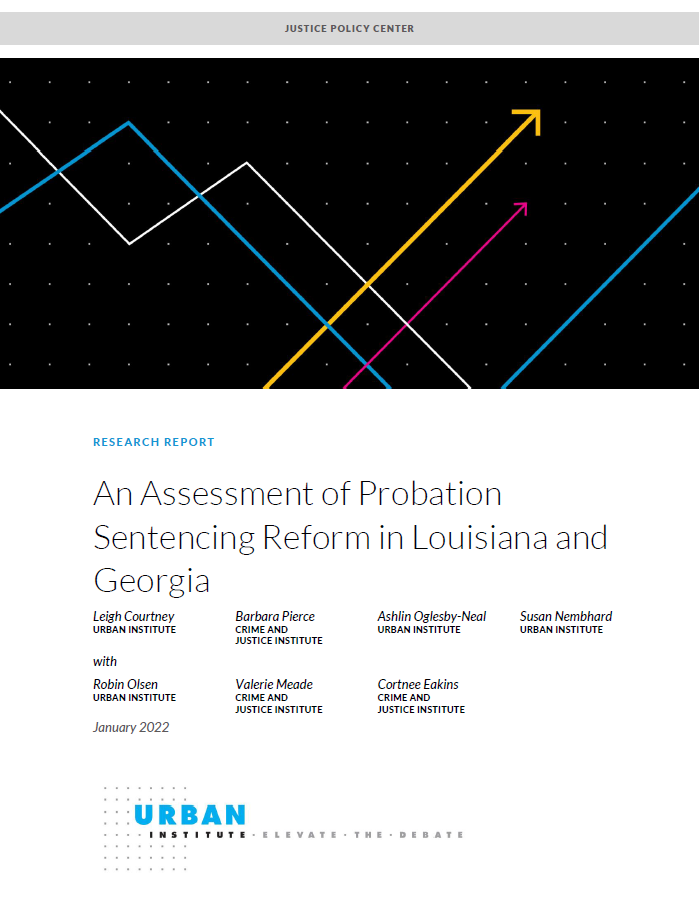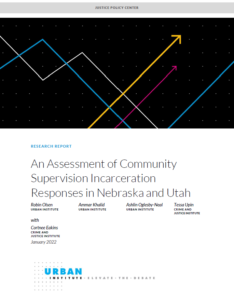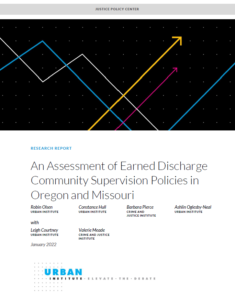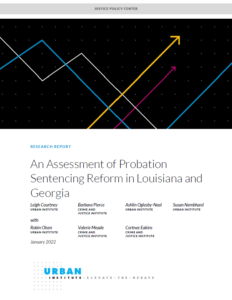
Many states have enacted comprehensive justice system reforms to reduce the use of incarceration and community supervision with the aim of focusing resources on people at higher risk of reoffending and investing in strategies to achieve better outcomes for people and communities.
The Crime and Justice Institute partnered with the Urban Institute to assess policy reforms in six states: Georgia, Louisiana, Missouri, Nebraska, Oregon, and Utah.



Read an overview of each of the three assessments below.
An Assessment of Community Supervision Incarceration Responses in Nebraska and Utah
Click here to read the report.
In 2015, Nebraska and Utah passed legislation to create a structured approach for responding to supervision violations. This included the use of time-limited incarceration stays that are shorter than full revocations of supervision. We conducted interviews with stakeholders and analyzed administrative data in both states to examine the implementation and effects of the reform to community supervision incarceration responses. Our analysis found that violation responses have changed in both states, moving from revocations or other pre-reform incarceration sanctions toward structured, short jail stays or incarceration caps. Additionally, while overall incarceration stays associated with supervision violations increased in both states after the reforms, the number of full revocations from felony probation decreased in Nebraska and the proportion of violations that received an incarceration response decreased in Utah.
The analysis also showed that successful completions for both states’ supervision systems either increased immediately after reforms were implemented or increased after a brief decrease. However, the analysis found that the use of time-limited incarceration responses did not make successful supervision completion more likely for particular cases in Nebraska, and in Utah, cases that received time-limited incarceration responses had higher recidivism rates than similar cases that did not. This brief offers recommendations that Nebraska, Utah, and other jurisdictions considering similar policies can consider to build on these pieces of legislation, including closely tracking both system-level and individual outcome metrics, establishing policies and practices that meet the goals of their approaches to supervision violation responses, and limiting the overall use of incarceration because of its potential criminogenic impact.
An Assessment of Earned Discharge Community Supervision Policies in Oregon and Missouri
Click here to read the report.
Missouri (in 2012) and Oregon (in 2013) passed legislation to implement earned discharge from supervision for people who fulfill their supervision conditions. The states use two different approaches; Missouri’s approach awards credits automatically for each month of compliance while Oregon’s approach includes a review of compliance at the midpoint of supervision to consider earned discharge and gives local supervision authorities discretion over implementation of the policy. We conducted interviews with stakeholders and analyzed administrative data in both states to examine the implementation and effects of the earned discharge policy reform. Our analysis found that people who receive earned discharge serve less of their original supervision sentence (two years shorter on average in Missouri and 13 months shorter on average in Oregon), and less of their sentence when compared to people who successfully complete supervision in other ways. Importantly, rates of the use of earned discharge can vary across a state when discretion at the individual or county-level is a large component of the policy design.
The analysis also found that people closing their supervision terms through earned discharge or earned compliance credits have similar recidivism rates compared to people who were otherwise eligible for earned discharge but who successfully complete supervision in other ways. This brief offers recommendations that Missouri, Oregon, and other jurisdictions can consider to build on these reforms, including clearly and simply defining eligibility for earned discharge, and reducing the discretion of judges or supervision staff to determine people’s eligibility to ensure consistency and equity in the application of earned discharge.
An Assessment of Probation Sentencing Reform in Louisiana and Georgia
Click here to read the report.
In 2017, Louisiana and Georgia passed legislation to reduce probation sentence lengths. We conducted interviews with stakeholders and analyzed administrative data in both states to examine the implementation and effects of the reform on community supervision sentence lengths. Our analysis found that sentence lengths among the overall probation populations decreased in both states after the reform was implemented. Additionally, the analysis showed geographic variation in the share of probation sentences reduced, likely due to the role of judges in the application of the policies.
This brief offers recommendations that Louisiana, Georgia, and other jurisdictions can consider to build on these types of sentencing reforms, including examining the interplay with other policies that may be implemented at the same time, considering the reduction on sentence lengths, reviewing data about other factors and policies (e.g., financial obligations) that may cause actual supervision lengths to increase, and monitoring the use of reforms and revising the policies to increase effectiveness.